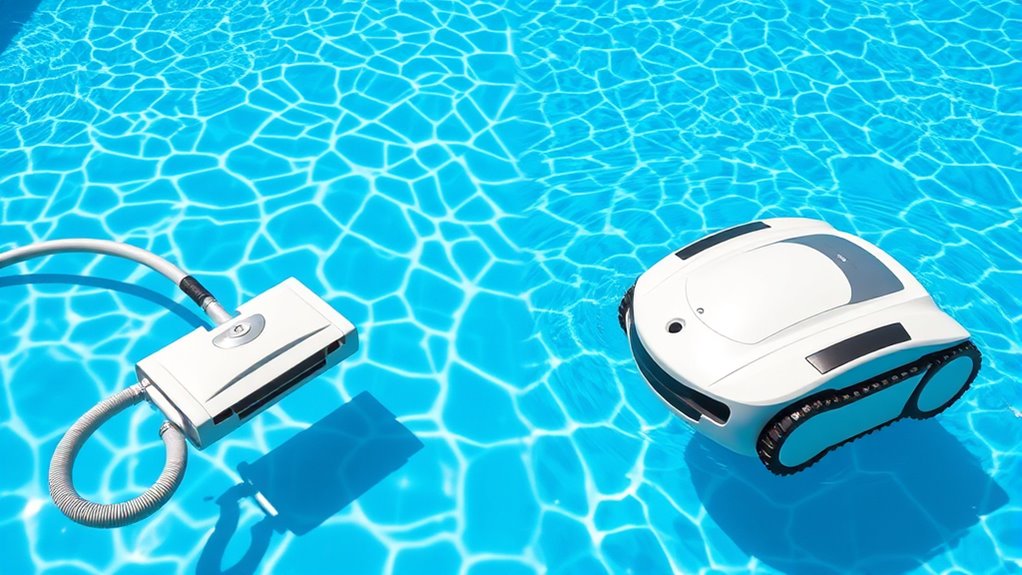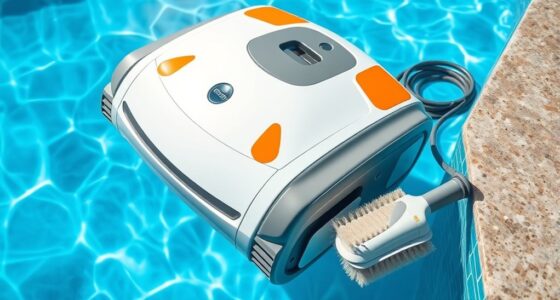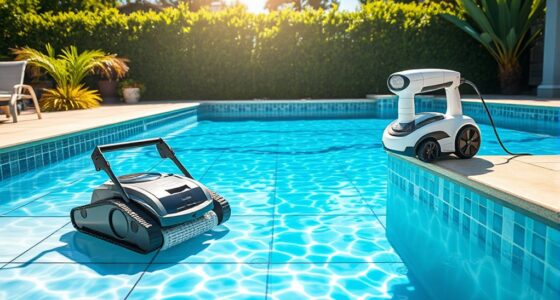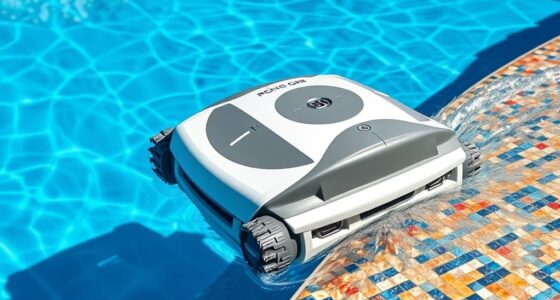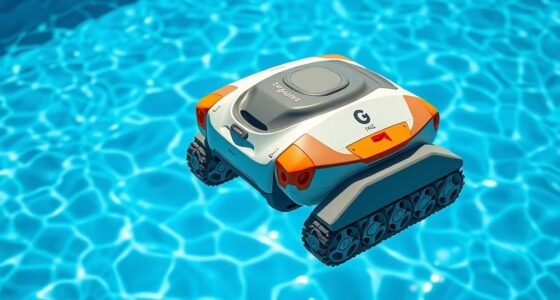Suction pool cleaners connect to your pool’s filtration system and move passively, making them affordable but requiring more manual effort. Robotic pool cleaners, on the other hand, are automated, navigate independently, and provide thorough coverage, often with advanced features. While robotic models tend to be pricier upfront, they require less maintenance and deliver better cleaning results. Want to find out which type suits your pool and budget best? Keep exploring to discover more details.
Key Takeaways
- Suction cleaners are budget-friendly and simple to install, relying on pool’s filtration system, while robotic cleaners are more expensive but offer advanced navigation.
- Robotic cleaners provide thorough, automated cleaning with sensors and mapping, covering hard-to-reach areas better than suction models.
- Suction cleaners require manual operation and maintenance, whereas robotic cleaners operate independently with user-friendly controls or apps.
- Robotic cleaners often have superior coverage and obstacle avoidance, making them ideal for irregular or large pools.
- While suction cleaners are cost-effective upfront, robotic cleaners deliver better long-term value with efficient, comprehensive cleaning.
Overview of Suction Pool Cleaners
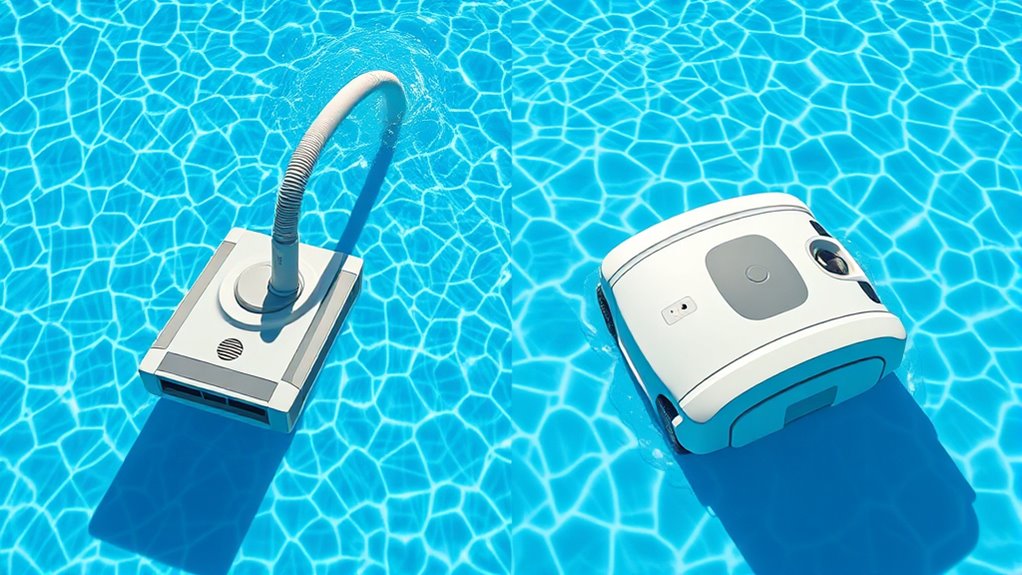
Suction pool cleaners are a popular choice for maintaining clean pools because they connect directly to your pool’s skimmer or dedicated suction line. They work by using the suction power from your pool’s filtration system to move around and pick up debris. As water flows through the cleaner, it traps dirt, leaves, and other particles, helping keep your pool water clear. These cleaners rely on water circulation to operate effectively, making sure all areas of your pool are covered. Since they integrate with your existing filtration system, you don’t need extra power sources or batteries. This setup makes them reliable and low-maintenance. Additionally, electric dirt bikes are capable of producing between 10 to 20 horsepower, which can enhance the power of some high-performance pool cleaning tools. Overall, suction pool cleaners are a straightforward way to enhance your pool’s cleanliness by improving water circulation and filtration. Proper maintenance of the filtration system can further improve their efficiency and longevity.
Overview of Robotic Pool Cleaners
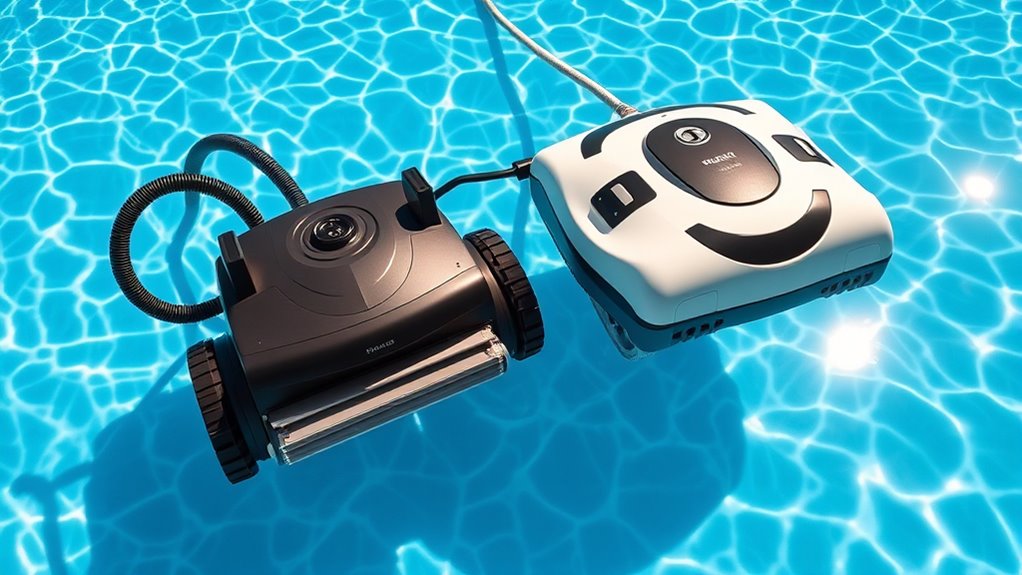
Robotic pool cleaners offer a modern and automated solution for keeping your pool spotless. They are designed to navigate and clean pools efficiently, often with minimal effort from you. When considering robotic cleaners, think about pool size considerations to ensure the device covers the entire area effectively. Installation requirements are usually straightforward, but some models may need a power outlet nearby or specific mounting options. Here’s a quick comparison:
| Feature | Benefits | Considerations |
|---|---|---|
| Pool size compatibility | Suitable for various pool sizes with adjustable settings | Larger pools may need longer cleaning cycles |
| Ease of installation | Simple setup, often plug-and-play | Check for nearby power sources |
| Navigation system | Advanced sensors for thorough cleaning | Some models require programming |
Additionally, selecting a model with efficient navigation can greatly reduce cleaning time and improve coverage. Ensuring the coverage area matches your pool’s size will help maximize efficiency and cleanliness. A maintenance routine is also important to keep the robotic cleaner functioning optimally over time.
Cost and Budget Considerations
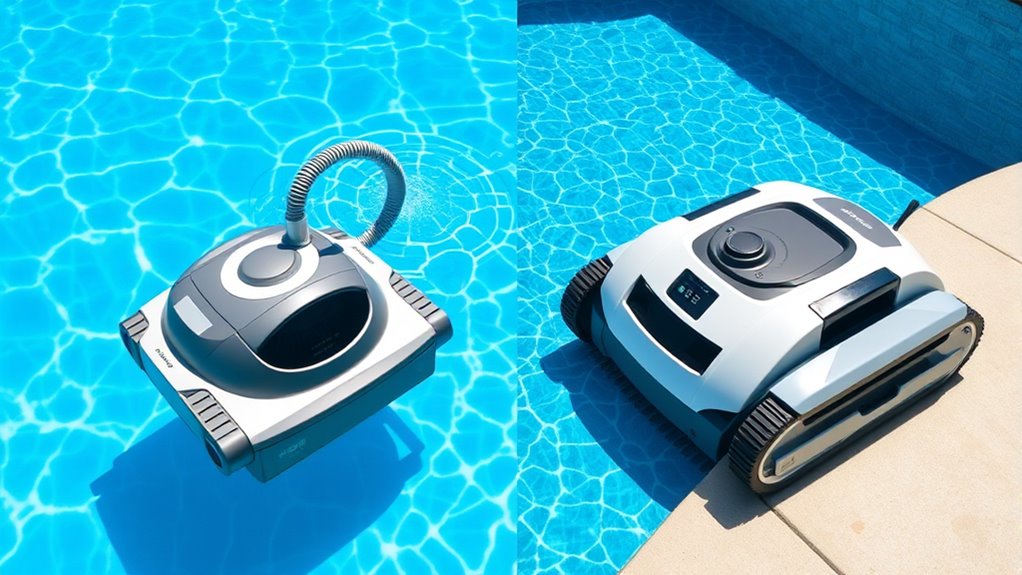
Considering the wide range of features and capabilities, budget is a key factor when choosing a pool cleaner. Suction and robotic cleaners come with different pricing models, from affordable basic units to high-end models with advanced features. Robotic cleaners often have higher upfront costs but may offer better long-term value through efficiency and durability. It’s also important to take into account brand reputation, as established brands typically provide better quality, customer support, and warranty coverage. While suction cleaners tend to be more budget-friendly upfront, robotic options can be a worthwhile investment if you prioritize ease of use and advanced features. Additionally, the effectiveness of the cleaning process can influence overall satisfaction with your choice. When evaluating options, it’s also beneficial to consider maintenance requirements to ensure your pool cleaner remains in good working condition over time. Proper understanding of technology integration in modern pool cleaners can significantly impact usability and performance. Moreover, considering energy consumption can help you choose a more cost-efficient model in the long run. Ultimately, balancing your budget with the quality and features you need will help you select the best pool cleaner for your needs.
Cleaning Performance and Effectiveness
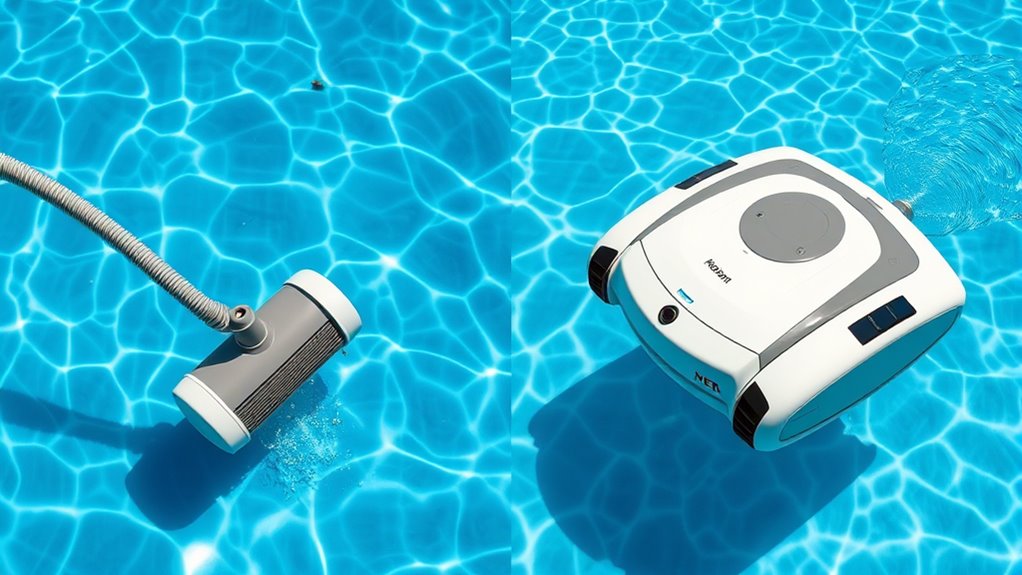
When it comes to cleaning performance, you’ll want to evaluate how powerful and efficient each cleaner is at picking up debris. Coverage area and reach are also important, so your pool gets thoroughly cleaned without missed spots. Additionally, deep cleaning capabilities ensure stubborn dirt and algae are removed, leaving your pool sparkling. For optimal results, consider the performance upgrades available for robotic pool cleaners to enhance their cleaning effectiveness.
Cleaning Power and Efficiency
Both suction pool cleaners and robotic pool cleaners are designed to keep your pool spotless, but they differ markedly in cleaning power and efficiency. Robotic cleaners often excel at thorough cleaning, thanks to programmable settings and advanced brushes, making them more effective at removing stubborn debris. Robotic cleaners can also adjust to different debris types more efficiently, utilizing sensors and adaptive algorithms for optimal performance. Furthermore, technological advancements have introduced features like smart navigation systems, which help robotic cleaners cover the entire pool surface more systematically. Suction cleaners rely on your pool’s pump power, which can be less consistent, especially if the pool’s chemical balance isn’t ideal. Additionally, robotic cleaners tend to be gentle on pool liners, reducing the risk of damage, while suction models may cause wear if not used properly. Consider these points:
- Robotic cleaners adjust to different debris types more efficiently
- Suction cleaners may struggle with fine particles if pool chemistry isn’t balanced
- Pool liner compatibility is higher with robotic models
- Overall, robotic cleaners offer better cleaning power and efficiency
- Advances in automation technology have led to more sophisticated and effective robotic pool cleaners.
Coverage Area and Reach
Robotic pool cleaners typically provide superior coverage because they can navigate the entire pool surface independently, reaching areas that suction cleaners might miss. This ability reduces coverage limitations, ensuring more thorough cleaning. However, reach variability can affect their effectiveness in larger or irregularly shaped pools, as some models may struggle to access hard-to-reach spots or have limited mobility around obstacles. Suction cleaners usually follow a more predictable path, covering accessible areas but potentially missing corners or tight spaces. While robotic cleaners excel in coverage, their effectiveness depends on the model and pool layout. If your pool has complex features, choosing a robotic cleaner with advanced navigation can improve reach and overall cleaning performance. Additionally, maintenance requirements for robotic cleaners can influence their long-term efficiency and effectiveness, especially considering the technological complexity involved in their operation. Proper regular maintenance can help ensure consistent coverage and prolong the lifespan of the cleaner. Moreover, understanding navigation technology can help select a model that offers better coverage for your specific pool design, and an awareness of cost of operation is important for budgeting long-term maintenance expenses.
Deep Cleaning Capabilities
Robotic pool cleaners often deliver superior deep cleaning performance because they are equipped with advanced brushes and powerful suction systems that effectively break down and remove dirt, algae, and debris from the pool surface and surfaces. Their thorough cleaning ensures your pool remains crystal clear and hygienic. To maximize their effectiveness, maintaining proper pool chemical balance is essential, as it helps prevent algae buildup and enhances cleaning efficiency. Additionally, robotic cleaners often feature sensors that avoid obstacles, supporting user safety considerations. With their ability to target hard-to-reach spots, they excel at removing stubborn debris and algae. This results in a cleaner pool with less effort on your part and improved overall water quality. Incorporating strong communication skills when communicating with service providers or fellow pool owners can help you better understand and optimize your cleaning solutions. Understanding technological features can further enhance your ability to select and operate the most effective cleaning equipment for your needs. Consider these factors when choosing a deep-cleaning solution for your pool.
Ease of Use and Maintenance
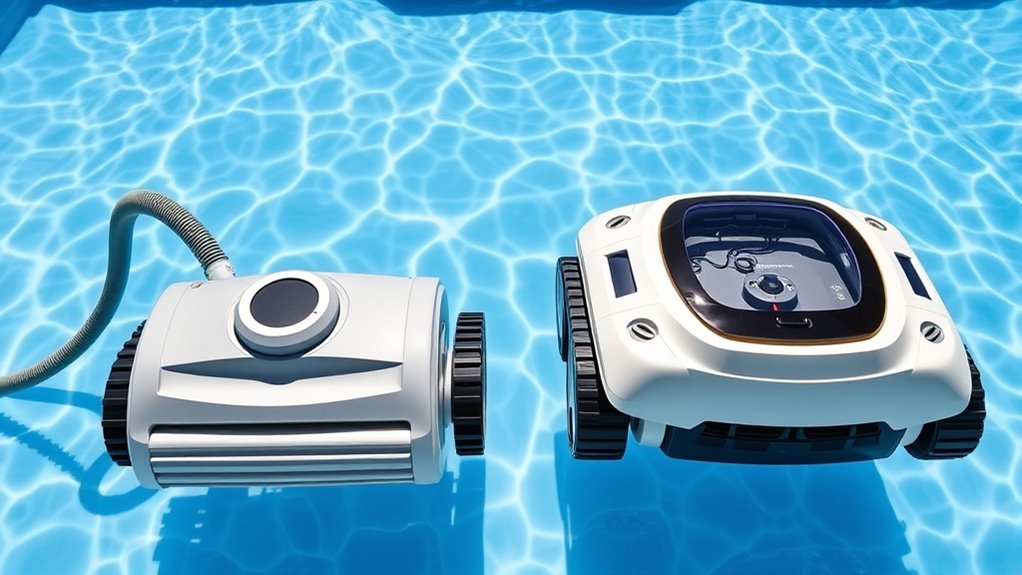
When it comes to ease of use and maintenance, suction pool cleaners often require more hands-on effort, as you need to regularly empty their debris baskets and occasionally unclog hoses. Manual operation can be more involved, since you might need to guide the cleaner or adjust settings frequently. Their user interface is usually simpler, often relying on manual controls rather than digital screens or app connectivity. This means you’ll spend more time performing routine maintenance and less time troubleshooting. While they are generally straightforward to operate, the ongoing upkeep can be time-consuming. In contrast, robotic cleaners handle most tasks automatically, but suction models demand your active participation to keep them functioning efficiently.
Features and Technological Advancements
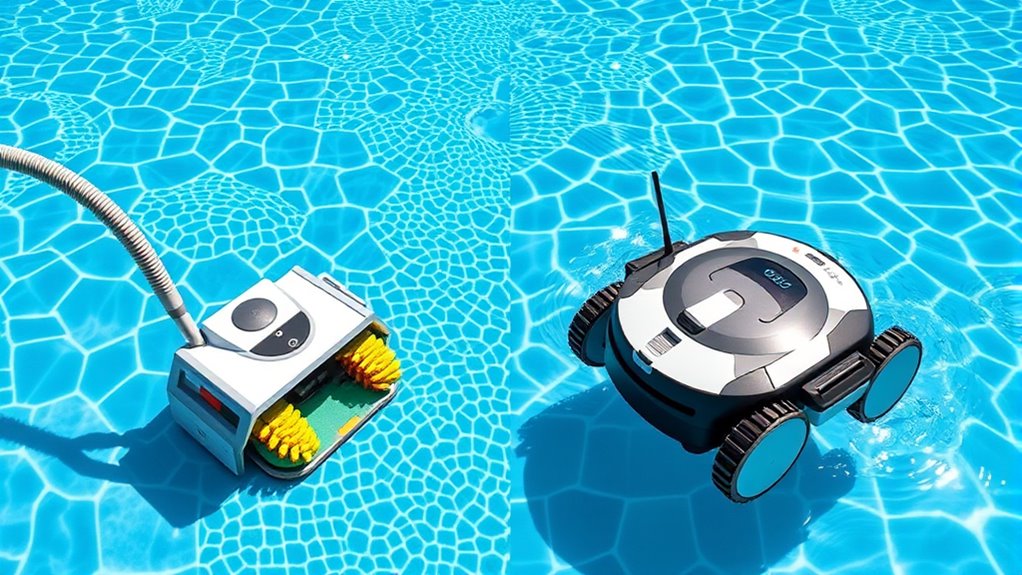
Modern pool cleaners come with advanced navigation systems that help them cover your entire pool efficiently. They also offer enhanced cleaning capabilities, targeting dirt and debris more effectively. These technological advancements make choosing the right cleaner easier and guarantee a thorough clean every time.
Advanced Navigation Systems
Advanced navigation systems have revolutionized the way pool cleaners operate by enabling precise and efficient cleaning paths. They eliminate the need for manual operation, saving you time and effort. These systems adapt to your pool’s size, guaranteeing thorough coverage regardless of dimensions. With advanced sensors, they detect obstacles, prevent missed spots, and optimize cleaning routes. Features include:
- Mapping technology for detailed pool layouts
- Random or systematic path planning
- Obstacle detection and avoidance
- Multi-directional movement for exhaustive cleaning
This technology ensures your pool gets cleaned efficiently without you having to oversee every step. It’s especially helpful for larger pools where manual operation would be tedious. Overall, advanced navigation systems make modern pool cleaning smarter, faster, and more reliable.
Enhanced Cleaning Capabilities
Enhanced cleaning capabilities have considerably expanded the effectiveness of pool cleaners by incorporating innovative features and cutting-edge technology. Modern models now offer superior scrubbing, targeted debris removal, and efficient coverage, making your pool cleaning more thorough. Robotic cleaners often include advanced sensors for better navigation, while suction models rely on powerful pumps. These improvements also enhance energy efficiency, reducing power consumption without sacrificing performance. Noise levels are minimized, allowing you to enjoy a quieter cleaning process. Some cleaners adapt to pool sizes and shapes automatically, ensuring thorough cleaning with less manual intervention. The table below highlights key features:
| Feature | Benefits |
|---|---|
| Energy-efficient motors | Lower power use, cost savings |
| Advanced sensors | Precise navigation, meticulous cleaning |
| Adjustable cleaning modes | Customizable for different debris types |
| Noise reduction tech | Quieter operation |
| Targeted scrubbing | Better debris removal |
Choosing the Right Pool Cleaner for Your Needs
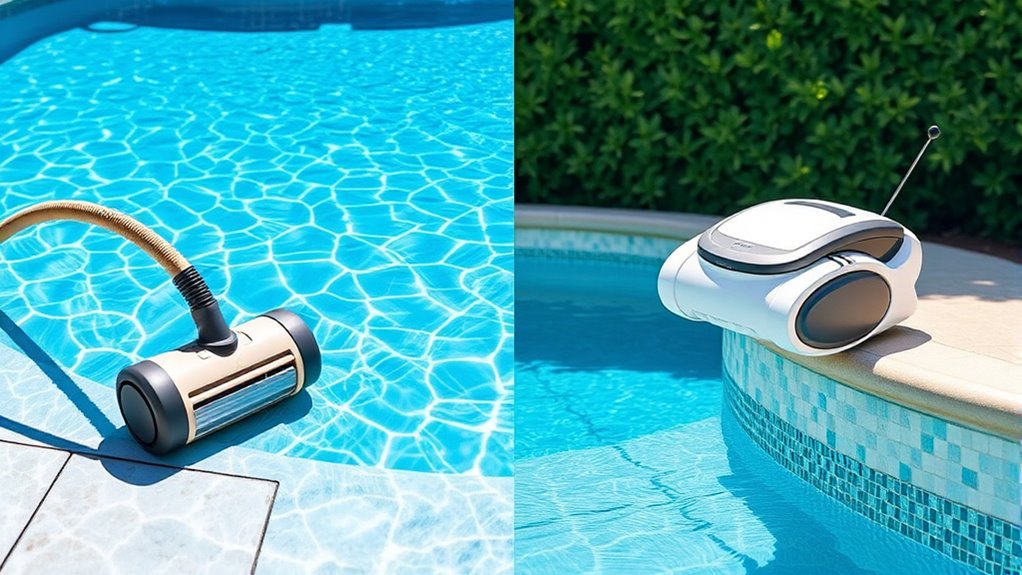
Choosing the right pool cleaner depends on understanding your specific needs and the characteristics of your pool. Consider factors like pool size, shape, and your maintenance routine. If you’re concerned about maintaining excellent pool water chemistry, a robotic cleaner with advanced filtering can help reduce debris that affects water quality. Energy consumption is also key; robotic cleaners typically use less power than suction models. Think about ease of use and maintenance requirements. If you prefer a hands-off approach, a robotic cleaner offers convenience. For more budget-friendly options, a suction cleaner may suffice. Ultimately, matching your needs with the cleaner’s features ensures efficient cleaning and helps preserve your pool’s condition.
Choosing the right pool cleaner depends on your pool size, shape, and maintenance needs.
- Pool size and shape
- Maintenance effort
- Water chemistry concerns
- Energy efficiency
Frequently Asked Questions
How Do Suction and Robotic Pool Cleaners Impact Energy Consumption?
Did you know that robotic pool cleaners typically use 90% less energy than traditional suction models? When it comes to energy efficiency, robotic cleaners generally have lower power consumption because they operate independently and are designed to optimize their cleaning cycles. Suction pool cleaners, however, tend to draw more power since they rely on your pool’s filtration system. So, choosing a robotic cleaner can markedly reduce your energy bills.
Are Robotic Pool Cleaners Suitable for Above-Ground Pools?
Robotic pool cleaners are suitable for above-ground pools, but you should consider above ground installation and pool size limitations. They’re designed to handle various pool shapes and sizes, making cleaning easier for you. Just make certain the robotic cleaner you choose fits your pool’s dimensions, and check if it’s compatible with above-ground setups. With the right model, you’ll enjoy a cleaner pool without hassle.
Which Type of Cleaner Requires More Frequent Repairs?
Like a car that needs regular tune-ups, some cleaners demand more attention. Robotic pool cleaners typically have fewer maintenance issues and lower repair frequency because they’re designed for durability and less manual intervention. Suction pool cleaners, on the other hand, often face more repair needs due to their simpler mechanics and exposure to debris, making them more prone to frequent repairs. Choose wisely to minimize ongoing maintenance hassles.
Can These Pool Cleaners Handle Large Debris Effectively?
You might wonder if these pool cleaners can handle large debris effectively. It depends on their debris capacity; some models have larger baskets or stronger suction, making them better suited for large debris. Robotic cleaners often use brushes and filters designed for bigger particles, while suction cleaners may struggle if their debris capacity is limited. Choose a cleaner with a higher debris capacity for more efficient removal of large debris.
What Are the Environmental Impacts of Each Cleaning Technology?
Think of it like choosing between two eco-friendly paths. You’ll find that robotic cleaners are generally more eco-friendly, using less energy and often featuring energy-efficient designs. They also tend to be made with sustainable materials, reducing environmental impact. Suction cleaners might use more power and contain less sustainable parts. Overall, robotic pool cleaners promote better material sustainability and eco-friendliness, making them a smarter choice for environmentally conscious pool owners.
Conclusion
Choosing between suction and robotic pool cleaners is like picking the perfect dance partner—each has its own rhythm. Think about your budget, cleaning needs, and how much effort you’re willing to put in. With the right choice, you’ll have a sparkling pool without breaking a sweat. So, weigh your options carefully, and soon you’ll be swimming in crystal-clear waters, celebrating a clean pool that’s as effortless as a gentle wave.
